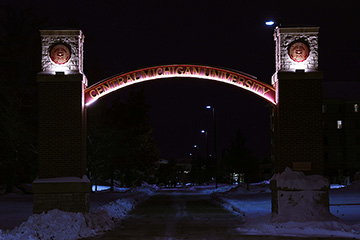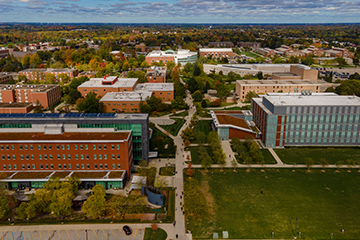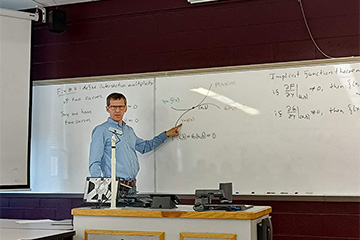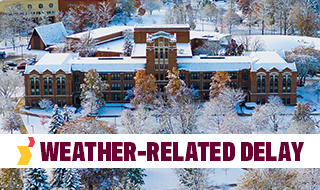How El Niño could affect this winter
Climate scientist shares his expertise to help you prepare
A climate pattern called El Niño has officially settled over part of the Pacific Ocean. This pattern can have significant effects on the weather of North America, including the Great Lakes. What could this mean for this winter’s weather in Michigan?
Zachary Johnson, a faculty member in the Department of Earth and Atmospheric Sciences, shared some insights on how your life could be affected by this. He also discussed the topic on an episode of The Search Bar podcast.
Q. How does a phenomenon in the Pacific Ocean affect Michigan’s weather?
The El Niño pattern, warming in the tropical Pacific Ocean, affects climates and weather worldwide. The warmer-than-normal tropical Pacific Ocean warms and increases the humidity of the overlying air, disrupting the tropical Pacific's typical weather pattern. This disturbed pattern propagates northward, affecting the jet stream off the west coast of Canada and the United States. Eventually, those jet stream changes propagate downstream in Michigan, impacting our local weather.
Q. What do we know about this specific El Niño event?
This El Niño event is consistent with past moderate-to-strong El Niño events. We see warmer-than-average sea surface temperatures extending from South America into the central tropical Pacific. Typically, an El Niño will peak in strength in the late fall and winter, coinciding with its greatest impact in the United States. But every El Niño has different flavors and differential impacts to the weather in the United States.
Q. What has an El Niño meant for Michigan winters historically?
Based on historical records, El Niño events favor warmer and dryer winters locally in Michigan due to a northward migration of the jet stream, which keeps the cold air north of us. As a result, the National Oceanic and Atmospheric Administration’s (NOAA) Climate Prediction Center forecasts warmer and dryer conditions this winter. This does not mean Michigan will not receive snow and cold snaps, but they may be less frequent and severe. If we average all the weather at the end of the winter, we may find that it is milder than your typical winter.
Q. In general, are Michigan winters getting more mild or more severe and how might El Niño affect that?
This is an active area of research, assessing whether climate change and climate variability like El Niño events can compound each other and promote a much milder winter here in Michigan than in the past. El Niño events should still favor milder winters moving forward, but combined with a warming climate, winters may become even more mild during future El Niño events.
One important scientific question to understand is if the connection between El Niño and our local weather will become enhanced in a changing climate. Our current understanding as climate scientists is that we will not see a change in the El Niño impact on our local winter weather in Michigan in a changing climate. This is an important area of research because El Niños affect many aspects of our society, including our agriculture, local economies, Great Lake water levels, winter ice cover extent, and lake ecosystems.
Q. How might this affect winter recreation this year? Should we prepare for winter a little differently?
Still expect snow and cold snaps. We will still have lake-effect snow events. But there may be fewer of these weather events. It may be one of those winters where you will look back and think we didn’t have much of a winter. This is welcome news to many looking for a mild winter compared to your standard Michigan winter, but it may negatively affect winter recreation for those looking to get out into the snow.
For the downhill skiing in Northern Michigan, the conditions may not be as good as your typical winter, but there will still be good ski days for those looking to hit the slopes. There should still be plenty of opportunities for snowmobiling, cross country skiing, ice fishing, but you may have to go a little further north than normal for those activities.
But look on the bright side, if it is milder winter due to El Niño, we won’t have to heat our homes as much.

About Zachary Johnson
Zachary Johnson is a faculty member in the Department of Earth and Atmospheric Sciences at Central Michigan University. He received his doctorate in climate science from Utah State University and also has worked as a researcher at Purdue University. His research interests include El Niño mechanisms and predictability, climate modeling, and extreme climate events.




